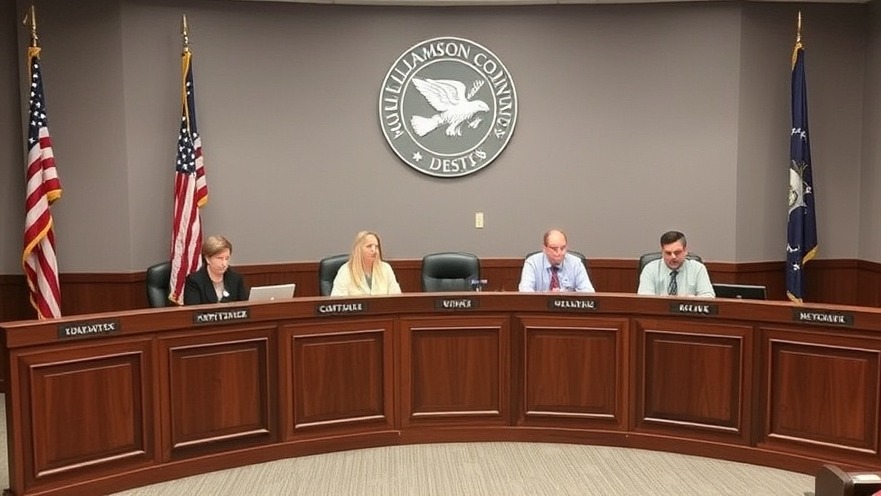
Understanding the Split: Atlas 14 Funding in Williamson County
In a recent heated meeting, Williamson County Commissioners found themselves divided over proposed increases in funding aimed at combating the challenges posed by the Atlas 14 rainfall data. This data, which indicates significant changes in expected rainfall patterns, has thrown into question the county's readiness for potential flooding and stormwater management. The funding debate has implications not just for municipal budgets, but for the safety and infrastructure resilience of the community.
The Rainfall Data That Sparked Controversy
Atlas 14 is a significant update to the National Oceanic and Atmospheric Administration’s (NOAA) precipitation statistics, suggesting that regions—including Williamson County—might experience heavier rains than previously forecasted. This change necessitates reevaluation of current drainage and flood mitigation efforts to adequately protect residents.
The disagreement among commissioners centers not only on the urgency of the funding increases but also on various interpretations of the data presented. Some commissioners advocate for immediate investment to safeguard the community against potential flooding, arguing that proactive measures can save lives and property in the long run. Conversely, others question the necessity and timing of the funding increases, citing budget constraints and the need for thorough studies before committing resources.
The Community's Concern: Public Safety Vs. Budget Constraints
For residents, the arguments surrounding Atlas 14 funding are deeply personal. Flooding has long been a concern in areas prone to heavy rain, and many families are still recovering from previous weather events. Lancaster and Georgetown, in particular, have experienced flooding events that tested the limits of their infrastructure. As discussions unfold in the commissioners' meetings, the stakes are high.
Local community members have begun voicing their opinions. Some residents feel urgency regarding addressing flooding risks, expressing fear that without the necessary funding, infrastructure improvements will come too late. Others worry about potential tax increases or reallocation of funds that may impact other essential services.
A Broader Perspective: Flood Management Challenges Across Texas
The situation in Williamson County reflects broader challenges faced by many Texas communities. Rising weather unpredictability, linked to climate change, necessitates a reevaluation of existing flood management frameworks across the state. Communities in Houston and other cyclone-prone areas have recently experienced devastating flooding due to severe storms, prompting local governments to consider significant infrastructural changes to better manage water flow during storms.
Local news outlets across Austin are monitoring the issue, amplifying the voices of constituents on various platforms. Citizen engagement is crucial, bringing attention to the urgency of funding decisions and prompting accountability from elected officials.
Moving Forward: What’s Next for Williamson County?
The decision-making process regarding Atlas 14 funding will likely have implications for urban planning not only in Williamson County but in surrounding areas as well. It will be essential for commissioners to weigh immediate public safety needs against budgetary realities. Solutions might include phased funding that allocates resources incrementally while allowing for ongoing assessments of flood risks.
Future meetings will continue to garner attention, particularly as officials are faced with the consequences of their decisions. Will Williamson County choose to be a leader in proactive flood management or hesitate until faced with another crisis?
How Community Advocacy Can Influence Local Politics
The outcome of the Atlas 14 funding debate illustrates the power of community advocacy. When residents come together to express their concerns and hopes, they can galvanize local leaders to act. Public forums, social media discussions, and civic engagement initiatives can exert significant influence on decision-making processes. Advocacy groups focused on environmental safety might rally community members to attend meetings and voice their opinions, ensuring that funding debates remain a priority.
Conclusion: The Importance of Vigilance in Local Governance
As the Williamson County commissioners navigate this contentious funding issue, it’s essential for residents to stay informed and involved. Whether through local news in Austin or direct community participation, voices matter in shaping policy. Engaging in discussions around Atlas 14 funding is not just about infrastructure; it's about the safety and well-being of the families who call this area home.
Take Action Now! Stay engaged with local governance; attend meetings, voice your concerns, and connect with community leaders. Together, we can influence decisions that directly impact our lives and environment.
 Add Element
Add Element  Add Row
Add Row 



 Add Row
Add Row  Add
Add 


Write A Comment